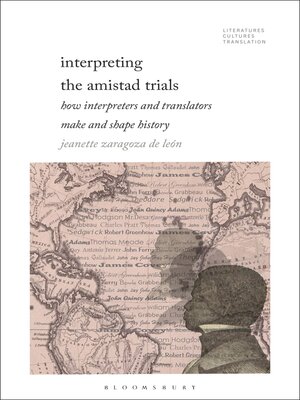Interpreting the Amistad Trials
ebook ∣ How Interpreters and Translators Make and Shape History · Literatures, Cultures, Translation
By Jeanette Zaragoza-De León

Sign up to save your library
With an OverDrive account, you can save your favorite libraries for at-a-glance information about availability. Find out more about OverDrive accounts.
Find this title in Libby, the library reading app by OverDrive.



Search for a digital library with this title
Title found at these libraries:
| Library Name | Distance |
|---|---|
| Loading... |
Interpreting The Amistad Trials traces the signal importance of interpreters and translators in the famous 19th-century Amistad case and discusses how race, ethnicity, slavery, and colonialism shaped this story.
From the recruitment process to the various oral to sign languages that mediated linguistically in the Africans' life inside and outside the courtroom, and from evidentiary documents to fraudulent translations to credible testimonies, Jeanette Zaragoza-De León demonstrates the crucial importance of translation and interpretation in the Amistad plot and outcome. De León examines handwritten letters, pamphlets, newspapers, and judicial files, and adopts a critical race theory and postcolonial lens to analyze these materials. Although these critical interpretations and translations travelled transatlantically via Europe, Africa, the Caribbean, and the United States, De León highlights the common thread which also geographically unites Venezuela, Puerto Rico, and the Dominican Republic as part of the Amistad story.
One of the most comprehensive studies of recorded events in the history of interpretation and translation in the Americas, Interpreting The Amistad Trials is a valuable resource for researchers studying coloniality, enslavement, race and ethnic studies and examining how these issues mattered then and now.
From the recruitment process to the various oral to sign languages that mediated linguistically in the Africans' life inside and outside the courtroom, and from evidentiary documents to fraudulent translations to credible testimonies, Jeanette Zaragoza-De León demonstrates the crucial importance of translation and interpretation in the Amistad plot and outcome. De León examines handwritten letters, pamphlets, newspapers, and judicial files, and adopts a critical race theory and postcolonial lens to analyze these materials. Although these critical interpretations and translations travelled transatlantically via Europe, Africa, the Caribbean, and the United States, De León highlights the common thread which also geographically unites Venezuela, Puerto Rico, and the Dominican Republic as part of the Amistad story.
One of the most comprehensive studies of recorded events in the history of interpretation and translation in the Americas, Interpreting The Amistad Trials is a valuable resource for researchers studying coloniality, enslavement, race and ethnic studies and examining how these issues mattered then and now.







